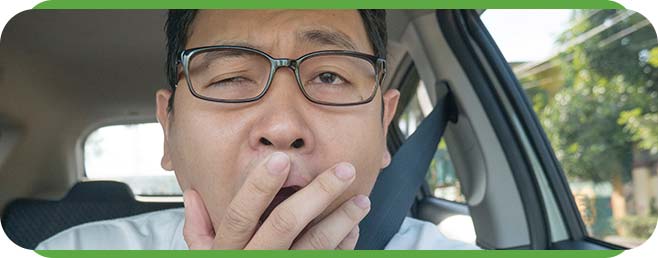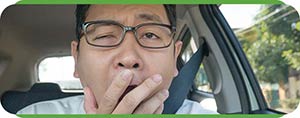What Are the Similarities Between Driving Drowsy and Driving Impaired?
To know the similarities and difference between driving drowsy and driving impaired, talk to our team at Koala® Center For Sleep & TMJ Disorders. For more information, call us or visit us online to book an appointment. We have convenient locations across the U.S. in Bloomington IL, Peoria/Dunlap IL, El Paso TX and Wausau WI.


Table of Contents:
What are the similarities between driving drowsy and driving impaired?
Can lack of sleep cause similar effects as alcohol?
How can I sleep better?
Is an inability to sleep a sign of a bigger issue?
Driving is one of the most common ways to get around, and for many, it is a daily activity. Operating a motor vehicle requires mental alertness, attention and fast reaction times. If a person does not get enough sleep, their cognitive abilities are impeded, which can result in dangerous driving conditions. In fact, driving while tired is just as dangerous as driving under the influence of alcohol, and in some cases more so, as a breathalyzer cannot detect drowsiness.
According to reports from the NHTSA (National Highway Traffic Safety Administration), in 2017 drowsy driving was the culprit for at least 91,000 car crashes, 50,000 injuries, and 795 deaths; these figures are fairly consistent each year. By contrast, the number of alcohol-related fatal crashes in 2017 was 9,949; this is nearly 30% of all fatal crashes.
Using blood alcohol measurements, alcohol impairment is fairly easy to determine, but sleep deprivation is tougher to measure, especially after the fact. Because most people are unwilling to admit they were driving while sleepy, experts believe that drowsy driving accidents are often mistakenly attributed to other factors, and after careful analysis, the real number of annual fatalities due to drowsy driving in the US may be closer to 6,000. This would mean drowsiness is involved in approximately 21% of fatal crashes every year with an estimated societal cost of anywhere between $12.5 billion and $109 billion per year.
Yes, lack of sleep can cause similar effects as alcohol intoxication. Starving the body of sleep robs neurons of the ability to function properly in the same way that alcohol does. This leads to cognitive lapses in how we perceive and react to the world around us, which can have a profound impact on the ability to drive safely.
Severe fatigue exerts a similar influence on the brain to drinking too much, yet no legal or medical standards exist for identifying overtired drivers on the road the same way that drunk drivers are targeted.
There are many factors involved in getting a good night’s rest; a few proven ways to improve sleep quality include:
– Increase bright light exposure during the day
– Reduce blue light exposure in the evening
– Reduce irregular or long daytime naps
– Sleep and wake at consistent times
– Take a melatonin supplement
– Try supplementing iron (for Restless Legs Syndrome)
– Avoid drinking alcohol
– Optimize your bedroom environment
– Set your bedroom temperature
– Do not eat late in the evening
– Relax & clear your mind
– Take a relaxing bath or shower
– Rule out a sleep disorder
– Get a comfortable bed, mattress and pillow
– Exercise regularly — but not before bed
– Do not drink any liquids before bed
There are many possible reasons for sleeplessness, including certain medical conditions, individual sleeping habits, and lifestyle choices. While some may require medical attention, other causes are minor and may improve with self-care.
Causes of sleeplessness may include aging, consuming too much caffeine, too much stimulation before bedtime (such as playing video games, watching television or exercising), noise disturbances, an uncomfortable bedroom (too bright, warm or loud), or a feeling of excitement. Sleeping too much during the day or too late in the day, lack of exposure to sunlight, frequent nighttime urination, physical pain, jet lag, and some prescription medications (particularly stimulants) may also lead to difficulty sleeping.
For many people, mental health problems like stress, anxiety or depression may also affect their sleep. For others, sleep issues are due to a sleep disorder such as restless legs syndrome, insomnia, sleep apnea or narcolepsy.
If you are experiencing daytime drowsiness, the sleep team at Koala® Center For Sleep & TMJ Disorders can help you determine the underlying cause and develop an effective treatment plan so you can live a better quality of life. Call us today to book an appointment with one of our sleep specialists, or visit one of our locations: we serve patients from all across the United States.

Additional Services You May Need
▸ KoalaKIDZzz®
▸ Sleep Apnea
▸ Snoring
▸ TMJ Disorder
▸ Fatigue
▸ Sleep Disorders
▸ Weight Loss
▸ CPAP Alternative
▸ Oral Appliances




